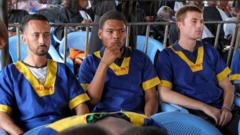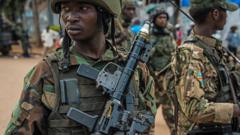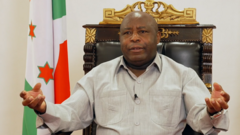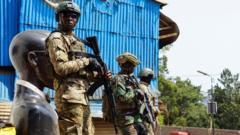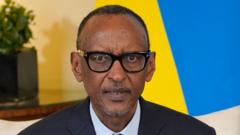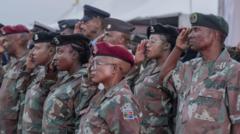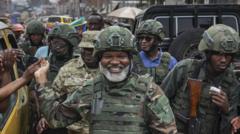In a move signaling potential diplomatic engagement, three American citizens sentenced to death for participating in a coup attempt in the Democratic Republic of Congo have had their sentences commuted to life imprisonment. This development reflects Congo's efforts to bolster relations with the U.S. amid ongoing regional conflict.**
American Death Sentences Commuted in Congo Amid Diplomatic Efforts**

American Death Sentences Commuted in Congo Amid Diplomatic Efforts**
The Democratic Republic of Congo commutes death sentences for three Americans involved in a failed coup as it seeks to strengthen ties with the United States.**
Three American citizens have had their death sentences commuted to life imprisonment following their involvement in a failed coup attempt in the Democratic Republic of Congo (DRC) in 2024. The decision, confirmed by a spokesperson for the Congolese presidency, comes as the DRC seeks to deepen diplomatic ties with the United States amidst ongoing regional instability.
The trio—Marcel Malanga, Tyler Thompson, and Benjamin Zalman-Polun—were initially sentenced to death last September alongside 34 others for their participation in an attempted coup against President Felix Tshisekedi's government. The coup attempt culminated in a violent confrontation near the presidential palace, resulting in the death of the coup leader, Christian Malanga—an opposition politician.
Amid pressures from regional tensions, particularly from the Rwandan-backed M23 militia actively engaging in conflict in eastern Congo, the timing of the commutation appears strategic. This military faction has made significant territorial gains, leading to considerable civilian casualties and widespread displacement.
The commutation of sentences for the American citizens was termed "individual clemency" by Tina Salama, spokesperson for President Tshisekedi. Analysts interpret this action as part of Congo's broader initiative to engage the U.S. more robustly, potentially leveraging American influence to address the threats posed by M23.
In a dialogue with The New York Times earlier this year, President Tshisekedi expressed intentions to increase U.S. investment in Congo's rich mineral resources, which he asserted could lead to improved security and stability in the region. The hope is that U.S. diplomatic pressure on Rwanda could help curtail M23's advancements and bring about a ceasefire.
While the U.S. State Department had not provided immediate comments on the commutation, the implication is clear: the DRC is navigating its complex geopolitical landscape and recognizing that cooperation with the U.S. may offer a pathway to addressing the crises it faces internally and externally.

